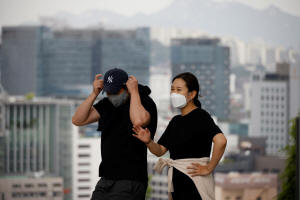Delta variant sweeps Asia, prompting curbs as vaccination remains tepid
 Send a link to a friend
Send a link to a friend
 [July 02, 2021]
By Hyonhee Shin and Swati Pandey [July 02, 2021]
By Hyonhee Shin and Swati Pandey
SEOUL/SYDNEY (Reuters) - The highly
contagious Delta variant of the coronavirus is surging through Asia this
week, with record numbers of infections in Australia and South Korea,
prompting some countries to tighten curbs and others to hasten
vaccination.
The variant, first detected in India in December last year, has spread
to about 100 countries and the World Health Organisation warned recently
that it could soon become the dominant form of the virus. It is also
driving a spike in cases in Japan, casting a pall over this month's
Olympic Games.
On Friday, Australia's New South Wales state, its most populous,
reported the biggest daily rise in new cases so far this year. Total
cases in the state in the latest outbreak have topped 200, a majority
caused by the Delta variant.
Sydney, home to a fifth of the country's 25 million population, is
half-way through a two-week lockdown to contain the outbreak, which has
alarmed authorities amid a sluggish nationwide vaccination drive.
"I think the vaccine will certainly reduce the disease, it will
certainly reduce hospitalisation. But we'll certainly have the virus
circulating in the community for those people who aren't vaccinated,"
said Professor Jill Carr, a virologist with the College of Medicine and
Public Health at Flinders University.

Australia, like several other countries in Asia, has struggled to
inoculate people as initial successes in containing the pandemic led to
vaccine hesitancy, and manufacturers were slow to ship doses.
Australia has fully vaccinated only 6% of its population, while Japan
has vaccinated 12%.
Japan reported on Wednesday that the Delta variant now accounts for
nearly a third of all cases in the eastern part of the country,
including Tokyo, and that could grow to 50% by mid July.
Tokyo and three neighbouring prefectures are among areas under a 'quasi'
state of emergency set to run through July 11 and the recent uptick in
infections has officials leaning towards keeping restrictions in place,
government sources have told Reuters.
On Friday, Tokyo governor Yuriko Koike reiterated that a ban on
spectators for the Olympic Games, which start on July 23, would be an
option if the coronavirus situation worsened.
In South Korea, officials said on Friday daily coronavirus cases topped
800, the highest in nearly six months, with vaccination below 10%. The
average number of new infections in the country has risen for 10 days
straight, and authorities in Seoul have delayed relaxing social
distancing measures.
"The Delta variant is a strain that is most optimised for widespread
transmissions," said Chun Eun-mi, a respiratory disease specialist at
Ewha Womans University Medical Center in Seoul.
"The cases of Indonesia, India and Britain show that not just Korea but
many other countries will need to rethink their vaccine strategy and
reopening plans," she said.
Indonesia, the world's fourth-most populous country, imposed emergency
measures that begin on Saturday until July 20 to contain a spike in
cases.
[to top of second column]
|

A couple wearing masks to avoid contracting the coronavirus disease
(COVID-19) take a walk at a park in Seoul, South Korea, May 26,
2021. REUTERS/Kim Hong-Ji

In India, the number of new infections has eased to
two-month lows since hitting a peak of 400,000 a day in May, with
the government focusing on mass vaccinations.
COVID CERTIFICATE
The United States has also seen a rise in Delta variant infections
in parts of the country where vaccination rates remain low, and the
White House said on Thursday it would send special assistance to
those hot spots.
Europe, too, is battling an increase in infections, which the WHO
has blamed on crowds at Euro 2020 football stadiums. It has warned
that a new wave was inevitable if people did not remain disciplined.
Britain is gearing up to lift lockdown restrictions on July 19, even
as Delta variant cases rise. Germany said on Thursday it expects the
variant to account for up to 80% of infections this month and
Portugal imposed night-time curfews.
The fresh cases have put a damper on summer tourism in the
continent, although the launch of a European Union COVID-19 travel
certificate may prompt more travel.
Europe's drug regulator said on Thursday the COVID-19 vaccines
approved in the European Union offered protection against all
coronavirus variants, including Delta.
In Asia, international tourism is largely suspended.
The exception is Thailand's tourist isle of Phuket, which reopened
on Thursday to fully vaccinated travellers from overseas in a step
towards reviving a battered industry.
Still, Thailand on Friday reported the third straight day of record
coronavirus deaths. The Alpha variant, first detected in the United
Kingdom, is still the dominant variant in the country, although
authorities said they expect the Delta variant to dominate in the
next few months.

"In Bangkok it is nearly 40%, within this month or next, it will all
be Delta," said Kumnuan Ungchusak, adviser to the health ministry.
"If this keeps going we cannot survive," he said referring to the
rising death count.
(Reporting by Swati Pnadey and Renju Jose in Sydney, Hyonhee Shin in
Seoul, Chayut Setboonsarng and Panarat Thepgumpanant in Bangkok,
Rocky Swift in Japan; Writing by Sayantani Ghosh; Editing by Raju
Gopalakrishnan)
[© 2021 Thomson Reuters. All rights
reserved.] Copyright 2021 Reuters. All rights reserved. This material may not be published,
broadcast, rewritten or redistributed.
Thompson Reuters is solely responsible for this content. |